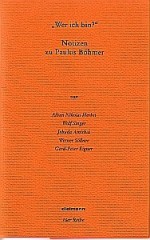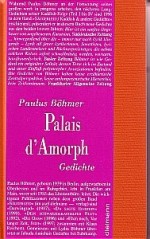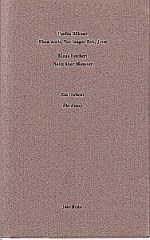Authors & Books
Paulus Böhmer
Paulus Böhmer was born in Berlin in 1939, he grew up in »Oberhessen« and in Ruhr, he now lives in Frankfurt am Main, where he managed the literature buro between 1985 and 2002. His publications- besides the ones at our publishing house are: the great volume »Kaddish & andere Gedichte« – »Darwingrad«, »Da sagte Einstein«, »Dein schwarzgekacheltes Blut« at Anabas publishinghouse, »Die Ohm« (1996 at Peter Engstler) and »Eben noch, Vor langer Zeit, Jetzt« (1997, in collaboration with Klaus Reichert).
He translates Jehuda Amichais’s poems togehter with Lydia Böhmer at Suhrkamp. For the volume »Tel Aviver Ungeduld« (Tel avivian impatiens), one of our publications, he translated with the help of Lydia Böhmer and Werner Söllner a poem by Asher Reich.

»Wer ich bin?«
- 32 pages
- Series »16pages«
978-3-929232-79-0

Published by Paulus Böhmer
Contents:
Alban Nikolai Herbst – Junge Frauen trinken Gifte
Wolf Singer – Ein Brief
Jehuda Amichai – Ein tel ist ein Hügel
Werner Söllner – Ein Brief
Gerd-Peter Eigner – Jagdgrund

Von den Schnecken
- 40 pages
- Series »16pages«
978-3-929232-53-0

with Katharina Hacker

Palais d'Amorph
- 192 pages
- Series Main Works (Reihe Die Hauptwerke)
978-3-929232-28-8


Säugerleid
Kaddish & other poems
- 208 pages
- Series Main Works (Reihe: Die Hauptwerke)
978-3-929232-29-5

„The fascination“, as Thomas Hettche from Journal Frankfurt writes, „which in those poems is based on the big gesture „it is everything together“, lies in the pieces of language, which seem to be added togeher associatively, but surprisingly make sense in some way. None of which is clear, but to some extent fragments of senses, bright moments“. „Paulus Böhmer...“, as Werner Söllner from Südwestfunk adds, „ is a radical realist, a romantic hymnicist with salacious vocabulary, who rips off the mask of our face and gives back the hymen to the world, without which we could not love her.“

Notiz über Monster/ Eben noch, Vor langer Zeit, Jetzt
- 24 pages
- Series »16pages«
978-3-929232-59-2

Together with Paulus Böhmer and Klaus Reichert
»In the Gothic Christian myths the human becomes brutalized. The animal, which he approaches, in turn takes a step: it adopts something human, which disturbs. This wolf is Mr. Isegrim, this owl is Dr. Weisheit« – whereby Victor Hugo, who writes this, could not have meant either Paulus Böhmer and Klaus Reichert, nor Klaus Reichert and Paulus Böhmer. Nevertheless, he means what bothers both of them in the present booklet, monsters in all shapes and the substance of the monstrous, and understands like both of them much about the monstrosity's timelessness: »The disappearance of reality is not lesser in the Middle Ages than in antiquity. In the logarithms of imagination one link is enough to change everything. It is a new incredible world. There are as many of this incredible worlds as types of credulity« – which is again hardly a direct allusion to Shakespeare's »Othello«, which Klaus Reichert targets to reflect on the monstrous. It is rather about the knowledge of the universality of the monstrous, which fills the smallest showcase as well as the cosmic world window of Paulus Böhmer, the concurrency of the most separated, the equilibrium of everything being far apart. »No one has had the final say about the unique cabinet of Japanese monsters in Den Haag-gallery. The fleeting science smiles about it, passes over and sets up the oracle: There are botchy hybrid links; but it is certain that this is cliff and impact for reflection for the serious observers.« – One may consider the present booklet as such a kind of cabinet, of which Saint-Hilaire wisely muttered: »Enigmatic!«








